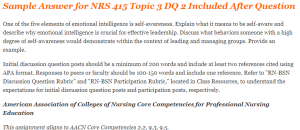Sample Answer for NRS 415 Topic 3 DQ 2 Included After Question
One of the five elements of emotional intelligence is self-awareness. Explain what it means to be self-aware and describe why emotional intelligence is crucial for effective leadership. Discuss what behaviors someone with a high degree of self-awareness would demonstrate within the context of leading and managing groups. Provide an example.
Initial discussion question posts should be a minimum of 200 words and include at least two references cited using APA format. Responses to peers or faculty should be 100-150 words and include one reference. Refer to “RN-BSN Discussion Question Rubric” and “RN-BSN Participation Rubric,” located in Class Resources, to understand the expectations for initial discussion question posts and participation posts, respectively.
American Association of Colleges of Nursing Core Competencies for Professional Nursing Education
This assignment aligns to AACN Core Competencies 2.2, 9.3, 9.5.
A Sample Answer For the Assignment: NRS 415 Topic 3 DQ 2
Title: NRS 415 Topic 3 DQ 2
This image both makes me laugh and realize the growth and self awareness I’ve gained not only in my 12 years as a nurse, but in my own personal life. Growing up in my house, emotions were not dealt with or spoken about. Conflict was never resolved and often times swept under the rug so many times until someone exploded. This hardened me, and stunted my emotional development. My logic and emotional responses were not aligned. I was not able to balance my emotions, and I did not take personal responsibility for my actions and mistakes or acknowledge how my feelings affected myself or others” (Butler, 2021). It took a lot of learning and living and creating and destroying different relationships to finally allow my brain and my emotions to align. Becoming a nurse definitely fueled my maturity and growth towards emotional intelligence. Caring for complex patients and death and dying taught me more empathy, and allowed me to develop more effective ways to process and manage my emotions in stressful situations.
Butler, J. (2021). Emotional Intelligence in Nursing Leadership. Australian Nursing & Midwifery Journal, 27(5), 18–21.
A Sample Answer 2 For the Assignment: NRS 415 Topic 3 DQ 2
Title: NRS 415 Topic 3 DQ 2
This image both makes me laugh and realize the growth and self awareness I’ve gained not only in my 12 years as a nurse, but in my own personal life. Growing up in my house, emotions were not dealt with or spoken about. Conflict was never resolved and often times swept under the rug so many times until someone exploded. This hardened me, and stunted my emotional development. My logic and emotional responses were not aligned. I was not able to balance my emotions, and I did not take personal responsibility for my actions and mistakes or acknowledge how my feelings affected myself or others” (Butler, 2021). It took a lot of learning and living and creating and destroying different relationships to finally allow my brain and my emotions to align. Becoming a nurse definitely fueled my maturity and growth towards emotional intelligence. Caring for complex patients and death and dying taught me more empathy, and allowed me to develop more effective ways to process and manage my emotions in stressful situations.
Butler, J. (2021). Emotional Intelligence in Nursing Leadership. Australian Nursing & Midwifery Journal, 27(5), 18–21.
A Sample Answer 3 For the Assignment: NRS 415 Topic 3 DQ 2
Title: NRS 415 Topic 3 DQ 2
Building emotional intelligence. I can relate to this on so many levels. I don’t know if that is a good or bad thing, lol. I too grew up in a household that didn’t talk about emotions or resolve conflict. Much stayed buried which caused a lot of stunted emotional growth in my early years and needed to be relearned or dealt with later on in life. I also had to learn from destroying certain relationships that these issues needed to be addressed by looking inward and focusing on my own emotional growth. I can imagine that becoming a nurse will only continue this emotional growth? Building emotional intelligence skills can not only help in leadership but can help motivate team members effectively in settings such as the nursing environment. (Landry, 2019).

Reference
Landry, L. (2019). Why emotional intelligence is important in leadership. Harvard Business School Online. https://online.hbs.edu/blog/post/emotional-intelligence-in-leadership
A Sample Answer 4 For the Assignment: NRS 415 Topic 3 DQ 2
Title: NRS 415 Topic 3 DQ 2
Self-awareness is having the ability to recognize one’s emotions, strengths, and weaknesses, as well as understanding how they can affect yourself and your team (Landry, 2019). In addition to self-awareness, emotional intelligence is a vital component of effective leadership in nursing.
Emotional intelligence is defined as the subset of social intelligence that involves the ability to monitor one’s own and others’ feelings and emotions, to discriminate among them and to use this information to guide one’s thinking and actions (Prezerakos, 2018). Emotionally intelligent individuals are able to use, understand and manage their feelings in a way that benefits themselves and others. In leadership, it is understood that leaders who are emotional intelligent have greater success at building positive relationships and influencing others to excel.
A person with a high degree of self-awareness can objectively evaluate themself, manage their emotions, align their behaviors with their values, and understand correctly how others perceive them (Perry, 2022). For example, a person who frequently self-reflects, is able to remain calm in stressful situations, behaves the way they want their team to behave, and have a good sense of how they appear to others is a highly self-aware and likely an effective leader.
Landry, L. (2019). Why emotional intelligence is important in leadership. Harvard Business School Online. https://online.hbs.edu/blog/post/emotional-intelligence-in-leadership
Perry, E. (2022). What is self-awareness and how to develop it. https://www.betterup.com/blog/what-is-self-awareness#:~:text=If%20you%27re%20highly%20self,%2C%20feelings%2C%20and%20thoughts%20objectively.
Prezerakos, P. (2018). Nurse managers’ emotional intelligence and effective leadership: A review of the current evidence.The open nursing journal, 12, 86–92. https://doi.org/10.2174/1874434601812010086

